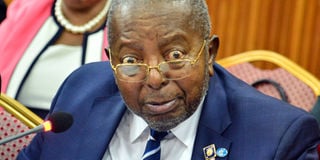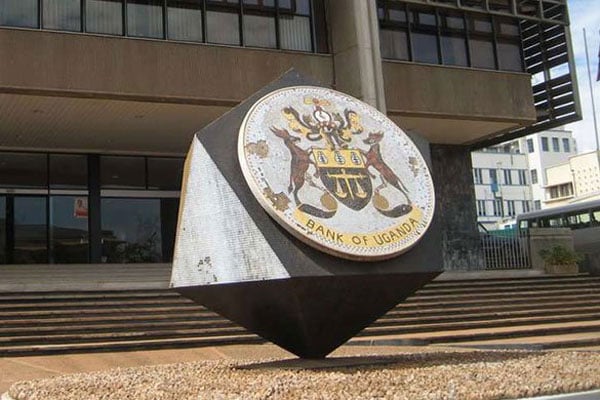Prime
What awaits the next central bank governor

Former Bank of Uganda Governor Emmanuel Tumusiime-Mutebile appears before Parliament’s Committee on Commissions, Statutory Authorities and State Enterprises in 2018. PHOTO/FILE
What you need to know:
Besides finding his shoes too big to fill, analysts believe the next BoU governor will not enjoy the privileges that were extended to Emmanuel Tumusiime-Mutebile.
A Herculean task awaits whoever will be appointed the country’s 11th central bank governor, experts have warned.
The prestigious Bank of Uganda (BoU) governor job fell vacant on January 23 following the demise of Emmanuel Tumusiime-Mutebile.
Before his death, Mutebile had been at the helm of the country’s central bank for an unprecedented 20 straight years.
Besides finding his shoes too big to fill, analysts believe the next BoU governor will not enjoy the privileges that were extended to Mutebile.
The length of time that the fallen governor enjoyed at the helm of the central bank will most certainly be off the table.
For starters, while the BoU Act gives the governor sweeping powers to double as the chief executive officer (CEO) and chairperson of the board of directors, we could be destined for a sea change.
Change is status
The Constitutional Amendment Bill, 2020, among other things, seeks to ensure that a BoU Governor does not double as the CEO and chairperson of the board of directors.
The proposed law was floated after a resolution of Parliament—approved on February 28, 2019—came hot on the heels of a presentation of the Committee on Commissions, Statutory Authorities and State Enterprises (Cosase) report by Bugweri County MP Abdu Katuntu.
This followed a probe that sternly greeted the closure and sale of commercial banks, including Crane Bank, National Bank of Commerce and Global Trust Bank.
The parliamentary committee resolved back then that it was impossible for the board to supervise operations and performance of the central bank for as long as the governor discharged the responsibilities of CEO and chairperson of board of directors at the same time.
Further, the proposed law also seeks to provide for the functions of the governor and a five-year term in office with an option for re-appointment.
Analysts weigh in
Despite being kept on a leash, Mr John Walugembe, the executive director of Federation for Small and Medium Enterprise (FSME), says the incoming BoU governor should do whatever it takes to maintain the independence of the central bank.
This includes its core traditional functions such as controlling the overall supply of money available to commercial banks, their consumers, and business interests.
He further noted: “We expect the new governor to champion policies that encourage the set-up of home-grown supervised financial institutions, promote greater innovations and digitalisation in the banking industry—specifically, piloting a digital currency.”
Mr Paul Corti Lakuma—a senior research fellow from the Economic Policy Research Centre (EPRC)—advises the incoming governor to strike a balance between the central bank’s core mandates and the political ambitions of the executive branch of the government.
Ms Peninah Mbabazi, a financial sector analyst, says the next BoU governor must find the right financing strategies required to resuscitate an economy still reeling from the Covid-19 pandemic and its curbs.
The right pick
Despite regulation and supervision of the banking economic sector being one of a central bank governor’s key performance indicators, Dokolo North MP Moses Ogwal Goli believes it would do Uganda a world of good if BoU’s top official is a macroeconomist.
Mr Ogwal, a trained economist with a speciality in private sector development, says such a candidate will easily understand the factors that either promote or retard economic growth.
He says a macroeconomist would also appreciate and support economic policies that prop development and progress while raising living standards.
Mr Ogwal also reckons that a macroeconomist would “ensure stability of exchange rates and inflation rate that will remain key, no matter the occupant of the governor’s office.”
The former director of Private Sector Development at the Private Sector Foundation Uganda, also says the country’s private sector apex body, the new governor will have no choice but to steer the country through speculation that has since been triggered by the final investment decision (FID) announcement.
With the recent announcement of FID by Total Energies and the China National Offshore Oil Corporation (CNOOC), the economy should expect an injection of at least $10b (about Shs35trillion).
It is widely believed that this investment shall trickle beyond the oil and gas sector ahead of the anticipated commercial production of oil in 2025.
“We are already seeing one phase of speculative situation where the Ugandan shilling has started gaining. Then we will see a second level with investment flows of about $10b being injected into the economy, putting a little bit of pressure on the exchange rate against the dollar,” Mr Ogwal notes, adding: “And then there will be a third level when the country begins to earn from the investment—all these stages have serious implication.”
Tough road ahead?
The appreciation of the currency will, Mr Ogwal argues, render production processes of most nascent domestic industries uncompetitive.
As a result, the economy will resort to importing things rather than producing them locally. Mr Ogwal believes this is a development that will doubtless worry whoever will be at the helm of the central bank.
Mr Fred Muhumuza, a lecturer at Makerere University’s School of Economics, reckons the tasks that have been left in the in-tray of the next BoU governor are familiar.
These include managing inflation, the financial sector stability, and, perhaps, most importantly, “improving the image of the institution.”
BoU recently suffered a chastening defeat in the Supreme Court at the hands of Crane Bank.
Mr Julius Kapwepwe, the director of programmes at Uganda Debt Network, and also coordinator of East African Budget Network (EABN), recommends that the next governor introduces a “speed governor” on liberalisation policy.
“I would want to see a governor who redirects Uganda into a developmental state that owns a major financial indigenous institution rather than simply full-throttle economic liberalisation,” Mr Kapwepwe concluded.
Facing strong headwinds
Uganda’s 11th central bank governor might well feel as if a poisoned chalice has been handed to them. What with the strong headwinds that are buffeting not just Uganda but the global economy!
Inflationary pressures
There appears to be a collective fear that the fight against inflation could put the world in a slump. Global inflation has climbed up to six percent.
In Uganda, core inflation has precipitated macroeconomic headaches after soaring from 2.5 percent pre-Covid-19 pandemic to a little over five percent.
Food prices are climbing at their fastest pace yet.
And it is not just Uganda. In the US, consumer-price inflation has reached seven percent. In response, central banks the world over are raising interest rates.
There has also been a tightening of monetary policy to address inflationary pressures that have proven to be more than transitory. This is something that we should come to expect of the new Governor if—much like Prof Emmanuel Tumusiime-Mutebile—they are obsessed with macroeco-nomic stability.
Supply chain stress
Since the advent of globalisation in the 1990s, the global economy has operated in such a way that when one place sneezes, others catch a cold. Put simply, there is no immunity to supply chain disruptions.
The pandemic has underlined just how the effects of a supply shock in one geographic region can reverberate around the globe. The net result of disruptions to production and shipping has been rising prices and empty shelves. Only recently, pandemic curbs triggered a logjam of fuel tankers at the Malaba and Busia borders. This helped create a fuel shortage in the hinterland that continues to hobble businesses in various ways.
Oil boom or bust?
The Final Investment Decision (FID) for the oil and gas sector in Uganda has left the country on the cusp of enjoying dividends totalling billions of dollars. But fears that a shift to zero-carbon energy may ultimately imperil fossil-fuel windfalls cannot be wished away. Big oil exporting countries are diversifying away from the so-called black gold.





